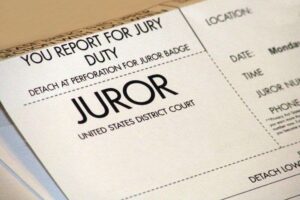What is a Deposition in Family Court?
A deposition is an important part of the legal process in a family court case. It allows the attorneys to gather information and evidence that may be used at trial. Understanding what a deposition is and how it works is crucial for anyone involved in a family court dispute.
Overview of Depositions
A deposition is out-of-court oral testimony that is given under oath. It involves attorneys asking questions of the deponent, who must answer the questions under penalty of perjury. Depositions are recorded by a court reporter or videographer.
The main purposes of depositions in family court cases are:
- To obtain information about the case
- To assess the credibility of witnesses
- To preserve testimony
- To obtain evidence for motions or trial
Depositions provide the attorneys an opportunity to learn information, evaluate witnesses, and build their case. The testimony given at a deposition also “locks in” a witness so their trial testimony must remain consistent.
When Are Depositions Taken in Family Court?
Depositions are usually taken during the discovery phase, after the petition and response have been filed. This allows the parties to understand the issues in dispute before questioning the witnesses. However, courts can allow depositions to be taken earlier in extraordinary circumstances.
Some common times when depositions occur in family court cases include:
- During contested divorce proceedings – to question the parties about assets, debts, income, and custody issues.
- When determining paternity – to question the mother and potential fathers.
- Prior to contested custody hearings – to interview witnesses like teachers or doctors.
- When complex financial issues are involved – to pin down business partners or accountants on financial facts.
Depositions rarely happen in uncontested matters since the facts are generally not in dispute. But in any contested family court case, they are an important tool for gathering information.
Who Can Be Deposed in a Family Court Case?
Many different types of witnesses are commonly deposed during family disputes. The only requirement is that the witness must have information relevant to an issue in the case.
Common deponents include:
- The parties to the case
- Experts like business valuators, psychologists, or financial planners
- Teachers, doctors, therapists or other persons with knowledge of the children
- Extended family members or friends with relevant information
- Bank officials, business partners or other people with financial knowledge
The attorneys have broad discretion when deciding who to depose. But they generally look for people with first-hand information who can provide unique insight into the disputed issues.
What Happens During the Deposition?
The process of taking a deposition is fairly straightforward. It involves the witness answering questions under oath while the attorneys observe and participate.
Location
Depositions usually take place at the office of the attorney requesting the deposition. However, they can also occur at other locations like a business office or the deposition witness’s home. Often, the attorneys will mutually agree on a convenient location.
Oath
The deposition begins with the court reporter or other authorized person administering the oath. The deponent then swears under penalty of perjury that the testimony they are about to give is the truth.
Questioning
Once the oath is complete, the questioning begins. Typically, the attorney that requested the deposition will ask their questions first. This is referred to as direct examination.
The opposing attorney will then get to ask follow-up questions, which is called cross-examination. Attorneys can object to improper questions, just like during a trial.
Recording
A stenographer will transcribe the full deposition testimony. Often a videographer will also record the deposition. This provides an official record of the witness’s testimony and demeanor while answering questions.
What Rules Govern Depositions?
Family court depositions are subject to both procedural rules and rules of evidence. These rules help ensure efficiency, fairness, and reliability.
Procedural Rules
Procedural rules dictate logistical issues like scheduling, who pays costs, time limits, etc. The specific procedural requirements vary between jurisdictions but may include:
- Reasonable notice – Parties are entitled to reasonable notice to prepare for a deposition.
- Time limits – Courts often limit depositions to just a few hours to maintain efficiency.
- Payment of expenses – The requesting party usually bears the costs like court reporter fees and video charges.
Evidentiary Rules
Evidentiary rules govern the types of questions that may be asked:
- Relevant questions – Questions must pertain to information reasonably calculated to lead to admissible evidence. Fishing expeditions are prohibited.
- Form of questions – Leading questions typically aren’t allowed during direct exam but are permitted on cross.
- Objections – Objections can be made to preserve issues for trial. The deponent still must answer.
- Instructions not to answer – Deponents can refuse to answer privileged questions.
Following the procedural and evidentiary rules helps ensure that depositions proceed fairly and efficiently while parties obtain the discovery they need for litigation.
How Can Deposition Testimony Be Used at Trial?
Testimony from a deposition can be critical for court hearings and trial. Attorneys use deposition transcripts and videos as tools to present evidence to the judge.
There are several ways deposition testimony may be used at trial in a family court case:
- Impeachment – If a witness’s trial testimony contradicts their deposition statements, their credibility can be impeached using the deposition.
- Refreshing recollection – Witnesses can review deposition transcripts to refresh their memory of relevant facts.
- Substantive evidence – The deposition itself can be submitted as evidence at trial, especially if a witness is unavailable.
- Motion hearings – Deposition excerpts are frequently used by attorneys when arguing motions.
- Cross-examination – Witnesses can be cross-examined at trial using their deposition answers.
Because deposition testimony is under oath, it carries significant weight. It is a crucial part of developing a thorough case for trial.
When Are Depositions Inadmissible in Family Court?
While deposition testimony often provides important evidence, it isn’t automatically admissible at trial. Like all other evidence, deposition excerpts must meet foundational requirements to be admitted.
Common situations when deposition testimony may be inadmissible include:
- The witness is available to testify live – If a witness is present at trial, their deposition can’t be used instead unless the parties agree.
- Irrelevant or prejudicial testimony – Courts won’t admit deposition evidence that is immaterial, irrelevant, or overly prejudicial.
- Unqualified expert opinions – Experts must be properly qualified before their deposition opinions can be used.
- Hearsay issues – Deposition testimony that contains multiple layers of hearsay may not meet foundational requirements for a hearsay exception.
- Procedural defects – Serious issues like failing to properly swear the witness could make the deposition inadmissible.
Attorneys must lay the appropriate foundation before submitting deposition excerpts as substantive evidence at trial. objections to admissibility can often be resolved by redacting improper material from the transcript.
Benefits of Depositions in Family Court Cases
Depositions confer numerous advantages for parties in family court litigation. Understanding these benefits illustrates why depositions are such a vital component of the discovery process.
Information Gathering
The primary benefit of depositions is the opportunity to gather information directly from witnesses. Depositions allow thorough questioning on all relevant topics to pin down specifics. Attorneys can also follow up and clarify testimony.
This fact-finding purpose makes depositions far more useful than basic written discovery like interrogatories or requests for production. Oral testimony elicits nuanced information that written discovery cannot replicate.
Assessing Credibility
Observing a witness answering questions provides invaluable insight into their credibility. Their tone, body language, consistency, memory, and attitude under questioning speaks volumes.
Attorneys can use deposition observations to evaluate which witnesses will make convincing trial testimonies and which may falter under cross-examination. This allows smart decisions about who to call at trial.
Preserving Testimony
Depositions crucially preserve testimony in case witnesses become unavailable for trial. Videotaped depositions are particularly useful for capturing a witness’s demeanor.
For elderly witnesses, those leaving the jurisdiction, or witnesses with serious health conditions, depositions may provide the only way to present testimony if the witness cannot appear at trial.
Settlement Leverage
Skilled deposition advocates can utilize the information and dynamics of a deposition to exert settlement leverage. Pinning a deponent down on harmful facts or exposing weak witnesses through deposition can motivate settlement.
The insights gained also allow attorneys to more accurately assess potential trial outcomes. This provides a richer foundation for settlement discussions.
Lower Costs
In some cases, taking a deposition can reduce litigation expenses. Depositions provide information informally at an office rather than requiring witnesses, parties, and attorneys to all appear at trial.
They also allow attorneys to adequately prepare clients without tedious trial days spent just waiting for a brief witness examination. Targeted depositions keep the focus on important witnesses.
For all these reasons, depositions are an indispensable component of effective family court representation. The benefits they provide make depositions a standard part of proper case preparation.
Potential Drawbacks of Depositions
Despite the substantial benefits depositions provide, there are some potential drawbacks associated with depositions in family court cases:
Expense
Depositions increase litigation costs since attorneys must compensate court reporters and often videographers too. There are also costs for attorney time, travel expenses, and document copying for exhibits. These costs can mount quickly, especially with multiple depositions.
However, this increase in upfront expense may pay dividends by streamlining the trial or motivating settlement, saving greater costs down the road.
Delay
The scheduling and taking of depositions adds another layer to the litigation timeline. Opposing counsel may drag their feet on deposition dates. Multiple depositions with busy witnesses can substantially prolong the pretrial process.
Judges try to mitigate these risks by ruling promptly on deposition disputes and limiting the number or duration of depositions. Efficient attorneys also avoid unnecessary depositions.
Increased Conflict
Contentious depositions can ratchet up animosity between the parties by probing sensitive topics and exposing contradictory facts. Deposition disputes may harden negative feelings.
Yet for attorneys to properly advocate, difficult depositions are sometimes unavoidable. And uncovering hard truths earlier often leads to superior resolutions compared to leaving buried conflicts unaddressed.
Discovery of Unhelpful Information
There’s always the risk that the testimony obtained in a deposition will ultimately be unhelpful or even harmful to the attorney’s case theory. Witnesses may prove forgetful, confused, or contradict expected talking points.
However, skilled attorneys can often limit damage from unhelpful testimony by clearing up confusion or discrediting the witness. It’s also better to know about weaknesses ahead of trial.
While depositions have some risks and disadvantages, in most cases the benefits significantly outweigh any potential drawbacks. Attorneys can mitigate these risks through careful planning and execution.
Objections Commonly Raised During Depositions
Lawyers use objections as a tool at depositions to preserve issues for trial, limit improper questioning, and control the conduct of counsel. While objections cannot stop a deponent’s answers, they place key issues on the record.
Here are objections frequently raised at depositions in family court cases:
Leading Questions
Leading questions during direct examination suggest the desired answer to the witness. Objections to leading questions are common because deposition rules require non-leading questions on direct exam.
However, some leading questions may be permissible, like for introductory matters or to develop testimony. But substantive leading questions often draw objections.
Mischaracterizes Prior Testimony
When an attorney’s deposition question inaccurately summarizes a witness’s prior testimony, a “mischaracterizes” objection highlights the flawed premise. This signals improper questioning.
However, attorneys can rephrase questions to accurately reflect the testimony and elicit useful information.
Lacks Foundation
Before submitting records or data into evidence, foundation must be established to ensure admissibility. “Lacks foundation” objections assert that authenticity or admissibility has not yet been shown.
Proper foundation questions must come first ‒ who, what, when, where, and how the information was obtained, produced, or authenticated. This lays the groundwork for admissibility.
Calls for Speculation
When an attorney asks a witness to guess an answer or provide an opinion beyond their direct knowledge, “speculation” objections call out the flawed question.
Speculation should be avoided in favor of facts personally known to the deponent. Alternative phrasing like “Do you have any idea…” mitigates this objection.
Argumentative Questions
Questions should seek information, not argue issues. “Argumentative” objections highlight questions where the attorney is debating rather than eliciting discovery responses.
However, zealous representation sometimes motivates these objections more than improper questioning. Attorneys enjoy wide latitude to ask probing questions.
Understanding common deposition objections allows lawyers to pose proper questions while also preserving key issues for trial. Objections create a record but rarely halt a deposition, allowing attorneys to still gather necessary information.
Instructions Not to Answer: When Deponents Can Refuse to Respond
Unlike objections, “instructions not to answer” stop the deposition temporarily since the deponent refuses to respond to improper questions. In limited cases, the deponent can properly halt questioning.
Common situations when a deponent may issue instructions not to answer include:
Privileged Information
Parties and other witnesses can refuse to answer questions seeking information protected by a privilege like attorney-client communications or medical information. Privilege objections must clearly state the privilege invoked. The examiner can seek to overcome privilege by establishing exceptions or waiver.
Matters Beyond Court’s Jurisdiction
If a deposition begins exploring issues irrelevant to the court’s jurisdictional limits or the claims in the particular case, the deponent can refuse to answer after objecting. However, counsel must tread carefully since instructing a client not to answer risks sanctions.
Harassing Questions
When an attorney’s questioning becomes clearly harassing or abusive with no legitimate purpose, the deponent may halt answering. But disagreeableness alone does not justify obstruction absent bad faith questioning.
Violations of Confidentiality
Confidentiality obligations like trade secret protections may require instructions not to answer to avoid public disclosure of sensitive information. However, a protective order can usually facilitate disclosure between parties without public exposure.
Due Process Rights
To protect constitutional rights, parties to litigation can limit depositions in some contexts based on due process concerns or issues like self-incrimination. These instances require great care and are rarely proper in civil family court settings.
While limited circumstances justify instructions not to answer, attorneys must be cautious in advising clients to obstruct a deposition without an airtight rationale. Otherwise, the objecting party may face sanctions or other consequences. Silence is usually not the best response in deposition disputes.
Sanctions for Deposition Misconduct
Misconduct during depositions can derail the proceedings and undermine the integrity of the discovery process. In egregious cases, sanctions may be warranted to punish and deter objectionable behavior.
Common deposition conduct that may trigger sanctions includes:
Failure to Appear
If a properly noticed deponent simply does not appear at the deposition, the court can impose sanctions like paying the opposing party’s costs. Courts don’t take kindly to disregarding deposition obligations.
Refusal to Answer Questions
Instructing a client not to answer for improper reasons or encouraging unreasonable objections may be sanctioned as obstructing discovery. Instructions not to answer should be rare.
Speaking Objections
Attorneys cannot make lengthy objections that communicate information to the deponent or coach answers. Objections must simply state the legal basis, not give guidance to the witness.
Harassing or Argumentative Behavior
Sanctions may issue against attorneys who badger witnesses, attempt to intimidate deponents, or otherwise conduct themselves in clear bad faith. Zealous advocacy has limits.
Improper Coaching
Attorneys cannot coach deponents by objected “to form” without explaining the basis or suggest answers through objections. Excessive conferences between counsel and the deponent may draw sanctions if abusive.
Before imposing sanctions, courts consider whether there was a good faith attempt to resolve issues. Clear deposition misconduct that unjustly impairs discovery may still result in monetary sanctions after one warning.
Practical Tips for Excelling at Depositions
Succeeding at depositions requires thorough preparation, strategic questioning, quick thinking, and unflappable poise. Here are practical tips for maximizing success during family court depositions:
Know Your Case and Documents
Master knowledge of all facts, witnesses, and evidence provides flexibility to examine witnesses on all pertinent topics. Rigorous preparation unlocks effective lines of inquiry.
Outline Strategic Questions
Create outlines of key areas to explore and potentially impeaching questions. But remain flexible to probe unforeseen insights that arise. Follow the witness’s lead at times.
Listen Closely to Answers
Actively focus on each answer to identify opportunities for follow-up questions and pin down specifics. Digest insights for use later in the deposition or at trial.
Ask Only Leading Questions on Cross
Leading questions on cross-examination efficiently draw out contradictions and concessions without meandering narratives. But use open-ended questions for favorable witnesses.
Don’t Quarrel Over Objections
Avoid debating most objections. Rephrase and move on. Arguments only waste time and escalate tensions. But preserve key issues with objections.
Remain Calm Under Pressure
Highly contested depositions try even experienced attorneys. Stay poised, professional, and unflappable. Don’t take attacks personally or get drawn into distractions.
Preparation and strategic focus enable attorneys to maximize the effectiveness of depositions. Handling objections smoothly while staying adaptable also helps attorneys excel during this high-stakes phase of litigation.
Conclusion
Depositions are a critical phase of the discovery process in a family court case. They provide invaluable opportunities to gather facts, assess credibility, preserve testimony, and gain leverage―all crucial for trial preparation.
However, depositions also create costs, delays, acrimony, and procedural complexities. Attorneys must strategically balance these pros and cons when planning depositions. Overall, the substantial benefits of depositions in contentious cases usually outweigh the drawbacks significantly.
With thorough preparation, observance of deposition rules, and strategic questioning, attorneys can maximize productivity during depositions. These efforts lay the groundwork for ultimate success at trial or motivate favorable settlements. In family law disputes, few tools match the power of effectively planned and executed depositions.
FAQs
Q: What is the main purpose of a deposition?
A: The primary purpose is to discover facts, evidence, and assess the credibility of witnesses through oral testimony. Depositions allow thorough questioning before trial.
Q: Can a deposition stop a case from going to trial?
A: While not guaranteed, information revealed in depositions can motivate settlements by altering the parties’ assessments of the likelihood of success at trial. Neither side wants to risk an adverse verdict.
Q: Are objections required during depositions?
A: No, objections are optional. But making proper objections preserves key issues for trial. Failing to object might waive the issue later.
Q: Who pays for the costs of a deposition?
A: Generally the party that requested the deposition must bear the costs like court reporter fees and video charges. Each side usually pays its own attorney fees.
Q: Can you bring documents to a deposition?
A: Yes, attorneys use documents and exhibits during depositions to question witnesses. Proper foundation must be laid before submitting records into evidence.







